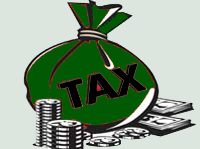 Government requires fund for various reasons like investing in defence, infrastructure, health and other social measures. Govt collects these funds from difference sources. One of the major sources of government revenue is TAX.
Government requires fund for various reasons like investing in defence, infrastructure, health and other social measures. Govt collects these funds from difference sources. One of the major sources of government revenue is TAX.
In India it’s divided into two parts. Any duty paid directly to the government is called direct tax and all others which are not directly paid are called indirect tax.
For example: Income tax which you pay on your income generated by way of getting salary from your employer or from your business is classified under direct where as customer and excise paid by you to a business man who in turn deposit that amount to government is not directly charged on you and as such it is classified under indirect.
Tax on income or wealth comes under this category. It’s charged on the income that an individual, a Hindu undivided family, a company, a firm or any other persons generate during the financial year. To get it charged, IT act has been framed with different provisions and rule as classification of income, exemption of income and deduction of income. One needs to understand all these to have an understanding of this topic.
To monitor these activities we have IT department which is a central government department. This department monitors each and every activity of income tax. If they found any person not paying it even though his incomes are chargeable then they may issue notices to collect it.
The onus of declaration and payment is on the person who generates such income. Higher rates of these may encourage havala transactions in india.
Indirect taxes are collected from you through different intermediaries like companies or business entity or service providers. For example: if you are buying goods then government has to collect certain amount as specified from the manufacturer and the manufacturer will in turn collect the same amount from you. By this, you are not paying it directly to the government but someone on your behalf collected and paid it to the government. Followings are a list which is classified under indirect category;
- Customs duty – levied on imported items
- Central Excise duty – levied on specific good manufactured in India
- Service Tax – Charged on services rendered
- CST
- Octroi
The person paying it can pass it on to another person which is not possible in the case of direct taxes.